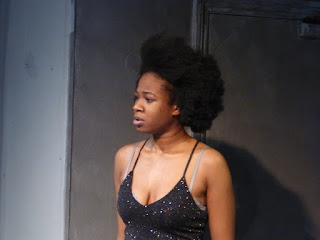We’ve been together, me and him - 47 years – because we respect each other: little secrets, little lies. He has his. Fine. I have mine…
I won’t say that this play bought back happy memories of my
junior school caning but it certainly made me think of Head Teacher Mr Pickup
and the duty he had to perform on myself and Michael Caffery after we had been
caught fighting. I was about ten and, as we had been pulled out from gym, the
Head went lightly on us as we were in shorts… I remember humiliation and tears
but, immediately we left his office, laughter as me and Mike both thought on
how silly the school was. This was a badge of honour and it fed our nascent anti-establishment
cool.
As a parent myself I’d have been very angry if my son had
been hit and I’m sure I got off lightly in 1971. Corporal punishment seems so
Victorian and so very “now” in the age of amygdala politics when the UK has
decided to give itself a good caning.
But, of course, The
Cane is not just about the abuse of pupils – punishment begins at home and
whilst hundreds of school children are seemingly outside laying siege to the
house of retiring deputy head Edward (Alun Armstrong) it’s the return of his
long-estranged daughter Anna (Nicola Walker) that represents the real
reckoning.
 |
| Where the heart is? |
There’s an element of sixties theatre about Mark Ravenhill’s
play, plenty of Becketesque stichomythia and a sparse design for a very smart set.
Alan Armstrong – who simply never ages – would have cut his theatrical teeth at
around that time as would Maggie Steed who plays his long-supporting/long-suffering
wife Maureen. It’s a real privilege to see them both perform and alongside the
amazing Ms Walker whose small-screen brilliance is rooted in incredible
expressive nuance and technically-flawless diction: she could read the phone
book and I’d still be enthralled by the time we got to the “z’s”.
The play is a puzzle with many humorous distractions along with
narrative misdirection as the family tensions are triangulated around Edward’s
record of corporal punishment as he prepares to end 45 years at “his school”.
All three are teachers and Anna works in the business-focused academy sector
which is anathema to her parents with its buzz-speak, pupil-focus and “eyes-front
policy” that makes pupils look only at their teacher – a seeming panacea for
underfunded and failing state education.
Anna is a public-private partnership storm-trooper sent to
torment her parents as her father fights desperately to respond to his school
being designated as failing. In reality, there’s little he can do, the status
is all but inescapable and, in these brave austere times, only an academy re-boot
could be sanctioned to “save” it. Edward can’t even use the right language in
response to the sentence and it is here that his daughter offers to help.
But, why now? The scenery reflects the secrets of the
family, the scars they still carry and which must be revealed for them to move
on. The marks left on the wall by Anna when she attacked her father with an axe
are still there, accepted and denied all at the same time and – as life passed
by no attempt was made to cover them up, they were just accepted.
Why did Anna attack her father and why has she become so
estranged that her mother emptied her room and burned all of her belongings?
Maureen also wants to burn the ledger of school canings that Edward took, along
with the cane itself which he removed not wanting to complicate matters as
personnel and policy changed.
Anna is shocked at this breach of best practice, she speaks,
as her mother has it, in the modern style but there’s more here than a change
of culture and a clash of generations. The real relations between the three are
revealed and the truth edges forward in unsettling waves from the stage.
Anna has a card from her two children at first her father
cannot think of a place to put it, but, as the real connections are revealed,
her mother places it over one of the axe marks on the wall. There acceptance
and the beginning of healing but also the potential for redemption for a woman
trapped for too long as the, literal, supporter of her over-bearing husband.
The interplay between the three is engrossing and
heart-breaking and you’re kept wondering throughout a script that treats modern
sensibilities with enough respect to make the audience “look forward”
throughout. Outstanding direction from Vicky Featherstone and Chloe Lamford's stage design is a charcacter in its own right.
A classic Royal Court play which runs only until 26th
January and there’s already limited availability so book now via their site.
IThankYou Theatre rating: **** Three unique performers channel Ravenhall’s crafted narratives with naturalistic focus… just
like if Rollerball was tennis and you had three players.









